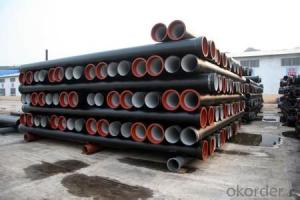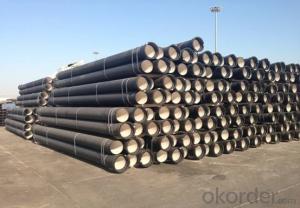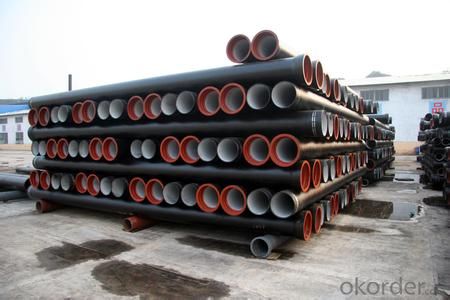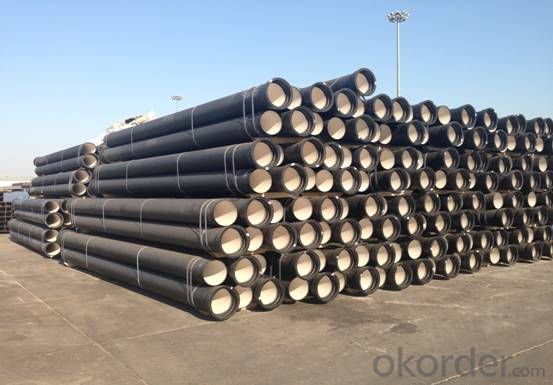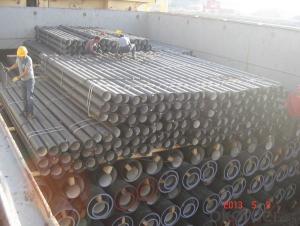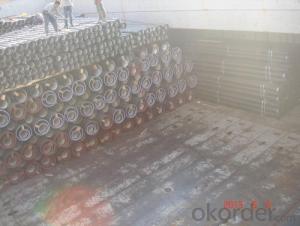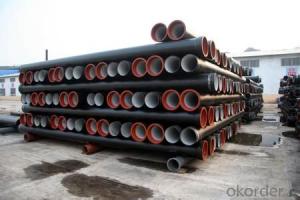DUCTILE IRON PIPE C DN125
- Loading Port:
- China Main Port
- Payment Terms:
- TT OR LC
- Min Order Qty:
- -
- Supply Capability:
- -
OKorder Service Pledge
OKorder Financial Service
You Might Also Like
Ductile Iron Cast Pipe is without any defects compare with tradition casting tech, which has many advantages particularly as follow:
(1) High density. In the "vertical upward casting" process, the melt iron of centre liquid column in center crystallizer is continuously feeding for volume shrinkage caused by condensation tube at outer circumference , which lead to be free of shrinkage porosity.
(2) High purity. When melt iron pouring, the mixed impurities such as gas, dross, sand grain which are lighter than melt iron could be eliminated at furnace mouth, its impossible to enter into the crystallizer through the channel, so the melt iron into the crystallizer is very pure.
(3) Strength with toughness. The cooling speed provided by continuous crystallizer is 30 times than sand casting and 5 times than centrifugal casting, and doesn't produce white iron, the eutectic cell volume of continuous cast iron is one eighth to one tenth compare with traditional cast iron. The density of graphite nodule in ductile iron can reach 300-700 pcs/mm2. Therefore, all reason above improve the strength and toughness of continuous cast iron.
(4) Free machining. The high speed cooling make the hardening phase (such as boride, steadite) not appear like reticular, massive or thick, but diffuse like fish bone and pane in shape, moreover, there are tiny graphite flakes inlaid hardening phase. It's free machining in BrinellHardness the range of 250-300HB. However, the Brinell Hardness of 250 is top limit to common metal materials.
(5) Uniform composition of tube wall. The convection mixing of liquid column caused by marching type drawing in crystallizer make the composition of tube wall well-distributed, and concentration gradient very little.
(6) High productivity. To the wall thickness of tube under 10mm, the speed of continuous casting is 1 meter/min, to the wall thickness of tube under 20mm, the speed of continuous casting is 0.5 meter/min, which is high efficiency that centrifugal or other casting tech couldn't reach.
- Q: What are the lubricants for the installation of ductile iron pipes for tap water?
- Lubricant used to reduce frictional resistance of friction pairs and to retard wear of lubricating medium.
- Q: What is the expected leakage rate for ductile iron pipes?
- The expected leakage rate for ductile iron pipes can vary depending on factors such as pipe age, condition, and maintenance practices. However, generally, ductile iron pipes are designed to have a low leakage rate of less than 1% of the total flow.
- Q: How does ductile iron pipe perform in high-pressure gas applications?
- Due to its unique characteristics and properties, ductile iron pipe is an outstanding option for high-pressure gas applications. Firstly, its high tensile strength enables it to withstand the immense pressure exerted by gas flowing through the pipeline, ensuring leakage or rupture-free containment. Additionally, ductile iron pipe exhibits remarkable resistance to corrosion, making it ideal for gas applications that may encounter moisture, chemicals, or other corrosive substances. This corrosion resistance guarantees the pipe's longevity and minimizes the risk of damage or failure caused by corrosion. Another advantage of ductile iron pipe in high-pressure gas applications is its capability to handle thermal expansion and contraction. As gas is transported under high pressures, temperature fluctuations occur, resulting in pipeline expansion and contraction. However, ductile iron pipe's flexibility allows it to adapt to these changes without compromising its performance or structural integrity. Furthermore, ductile iron pipe's smooth interior surface reduces friction losses and pressure drops, resulting in efficient gas flow. This smoothness also reduces the likelihood of gas impurities or debris becoming trapped, potentially leading to blockages or flow disruptions. In conclusion, when it comes to high-pressure gas applications, ductile iron pipe is a dependable and durable choice. Its high tensile strength, corrosion resistance, ability to handle thermal expansion, and smooth interior surface all contribute to its exceptional performance in demanding conditions.
- Q: Is the cast iron pipe buried in need of antiseptic treatment? What kind of anticorrosive materials are used?
- Is to put the pipe surface rust corrosion, polished clean, brush again primer, and then wrapped a layer of glass cloth wrapped paint, two layers of glass cloth on the line, the thickness of not less than 6mm, painted with epoxy coal tar paint or asphalt paint
- Q: How are ductile iron pipes protected against external soil loads?
- Ductile iron pipes are protected against external soil loads through several methods. One of the primary methods is the use of a protective coating on the exterior surface of the pipe. This coating acts as a barrier between the iron pipe and the surrounding soil, preventing direct contact and reducing the risk of corrosion. Another method of protection is the use of trench backfill materials. The soil used for backfilling is carefully selected and compacted to provide adequate support and load distribution for the pipe. This helps to minimize the stress and pressure exerted on the pipe by the surrounding soil. Additionally, the design and installation of the pipe system play a crucial role in protecting ductile iron pipes against external soil loads. The pipes are typically laid in a properly engineered trench, which includes appropriate bedding and backfilling techniques to ensure stability and minimize the potential for damage. Furthermore, the use of proper pipe jointing techniques is essential for protecting against external soil loads. Joints are often designed to be flexible, allowing for some movement and accommodating external loads. This helps to distribute the stress along the length of the pipe and prevents concentrated pressure points that could lead to failure. Overall, a combination of protective coatings, appropriate backfill materials, proper installation techniques, and joint design contribute to the effective protection of ductile iron pipes against external soil loads. This ensures the longevity and reliability of the pipe system, even in challenging soil conditions.
- Q: What is the weight of ductile iron pipes?
- The weight of ductile iron pipes can vary depending on their size and wall thickness. On average, a 10-foot length of 6-inch diameter ductile iron pipe can weigh approximately 180 pounds. However, it is important to note that different manufacturers may have slight variations in weight due to differences in manufacturing processes and materials used. It is recommended to consult specific product specifications or contact the manufacturer for accurate weight information.
- Q: What is the average weight of ductile iron pipe?
- The size and thickness of ductile iron pipe can cause fluctuations in its average weight. Typically, smaller diameters of ductile iron pipe weigh around 3.5 pounds per foot, while larger diameters can exceed 20 pounds per foot. It is essential to acknowledge that these weights are rough estimates and might slightly differ depending on the manufacturer and pipe specifications.
- Q: What pipe can be used to replace the cast iron pipe in the water supply? Thank you
- Cast iron pipes (Cast, Iron, Pipe), cast cast pipe. Cast iron pipes are used for water supply, drainage and gas transmission lines. They include cast iron pipes and pipe fittings. Labor intensity is small.
- Q: Are ductile iron pipes resistant to frost heave?
- Generally considered resistant to frost heave, ductile iron pipes can withstand the expansion and lifting of surrounding soil caused by freezing water in the ground. Their high tensile strength and flexibility prevent cracking or breaking under the forces exerted by frost heave. Moreover, ductile iron pipes have a high resistance to impact and can handle significant external loads, making them ideal for areas with freezing temperatures and potential frost heave. Additionally, the joints in these pipes are designed to tightly seal and prevent water infiltration, reducing the risk of freezing and subsequent frost heave. However, it is important to note that while ductile iron pipes are resistant to frost heave, they are not completely immune. Extreme temperature fluctuations, prolonged freezing conditions, or inadequate insulation can still jeopardize their integrity. Therefore, proper installation techniques, including using appropriate bedding and backfilling materials, thermal insulation, and regular maintenance, are crucial to ensure long-term performance and resistance to frost heave.
- Q: How are ductile iron pipes connected together?
- Ductile iron pipes are typically connected together using a variety of methods, depending on the specific application and requirements. The most common method of connecting ductile iron pipes is through mechanical joint fittings. These fittings consist of a bell end on one pipe and a spigot end on the other, which are joined together using a rubber gasket and bolts or clamps. The rubber gasket provides a watertight seal, while the bolts or clamps secure the joint and prevent any movement or separation. Another method of connecting ductile iron pipes is through flanged joints. Flanged joints involve attaching a flange to the end of each pipe, which are then bolted together using bolts and nuts. This method is commonly used in larger diameter pipes or in situations where the pipes need to be easily disassembled. In addition to mechanical joint fittings and flanged joints, ductile iron pipes can also be connected using push-on or restrained joint fittings. Push-on joints utilize a rubber gasket that is pushed onto the spigot end of the pipe, creating a secure and watertight connection. Restrained joints, on the other hand, incorporate additional features such as welded-on collars or mechanical devices to prevent movement and provide added strength to the joint. Overall, the method of connecting ductile iron pipes together depends on factors such as pipe diameter, pressure requirements, and the specific application. It is important to follow the manufacturer's guidelines and industry standards to ensure proper installation and reliable performance of the connected pipes.
Send your message to us
DUCTILE IRON PIPE C DN125
- Loading Port:
- China Main Port
- Payment Terms:
- TT OR LC
- Min Order Qty:
- -
- Supply Capability:
- -
OKorder Service Pledge
OKorder Financial Service
Similar products
Hot products
Hot Searches
Related keywords
